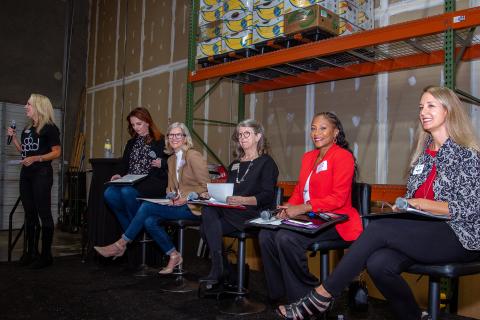Mecklenburg County Mothers face challenges at a heavy price
Share Charlotte hosted our first-ever Navigating the Necessities event on Thursday, October 13th.
More than 125 Charlotteans gathered at the Loaves and Fishes/Friendship Trays Warehouse to connect and hear five dynamic women speak about the challenges women face in Mecklenburg County.
Andi Stevenson, Founder and Principal of Stevenson Wallace LLC served as the moderator and sparked an important conversation with non profit executives tackling the challenges of child care, housing, food and employment.
Front line workers Janet Singerman, President and CEO of Child Care Resources, Elizabeth Kurtz, CEO of Charlotte Family Housing, Tina Postel, CEO of Loaves and Fishes/Friendship Trays, and Shemia Williams, Chief Programs Officer for Charlotte Works/NC Works shared insight about women who are struggling and having to choose between housing or employment.
Stevenson noted that all of these challenges are interrelated and cannot stand alone. Women in Mecklenburg County are struggling to navigate in these areas. "What is the most important thing people don’t understand about women and your subject area?” she asked the panel.
Navigating the Necessity of Employment
Shemia Williams, a client focus leader increasing economic stability for NC residents through training and development had this to say:
“Single mothers are not returning to work at the same rate as non parent women, women who are taking care of their parents and men. These women are deciding whether or not they are going to maintain the public assistance benefit or return to work! In order to live at a sustainable wage in Mecklenburg County, they must make $19 an hour. Higher compensation is just one of many factors that lend to why women are not returning to work.”
Navigating the Necessity of Child Care
Janet Singerman manages NC’s statewide system of 14 regional lead CCR&R agencies and 50 local CCR&R agencies. She gave the example of how child care expenses can be double the cost of fees for UNC Charlotte or UNC Chapel Hill. Here’s what she had to say.
“Access to economic opportunity can end with the birth of a child unless she has a spouse or partner, or someone to take care of her child, or is independently wealthy. Many women can’t work so they struggle to find food, housing, and child care.”
Navigating the Necessity of Housing
Elizabeth Kurtz is actively involved with issues of housing affordability in Charlotte, serving on multiple committees in the community. She had this to say.
“Stable housing has become a luxury. The average rent in Charlotte is $1500. Other expenses can get in the way. If you don’t know where your child’s next meal comes from, the fact that rent is due in two weeks is the furthest thing from your mind.”
Navigating the Necessity of Food
Tina Postel oversees a network of emergency food pantries and the primary Meals on Wheels program in Charlotte- Mecklenburg. She had this to say:
“One in five individuals in Charlotte are food insecure. Loaves and Fishes/ Friendship Trays is actually delivering groceries and meals to the school teachers whose car just broke down, the retired senior on a fixed income who was just prescribed a new medication, a teenager with three younger siblings who skips breakfast, a health care worker off of work due to an extended injury, a college student who faces the tough choices of buying a textbook or food for the month.”
To help these organizations amplify their voices in Mecklenburg County. Be sure to:
- Vote.
- Advocate.
- Volunteer.
- Donate.
Twenty-five non profit organizations assisting those in the areas of employment, child care, housing and food spoke to attendees about volunteer opportunities and other ways they could make a difference. For more information, visit their profile on SHARE Charlotte.
|
Good Friends Charlotte |
|
R.I.C.'s Market Foundation |




